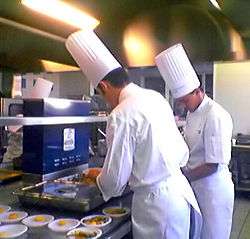Cook (profession)

A cook is a person who prepares food for consumption.
A cook is sometimes referred to as a chef, although in the professional kitchen, the terms are not interchangeable.

Professional usage
The term "cook" within a restaurant kitchen usually refers to a person with little to no creative influence on a menu and little to no command over others within the kitchen, such as a line cook. These are usually all members of a restaurant kitchen that are underneath the sous chef in the brigade de cuisine. Other establishments may have a relatively constant menu, often only having people that can prepare food quickly and consistently, having little need for an executive chef or sous chef. The kitchens in these particular restaurants would thus be entirely run by cooks intimately acquainted with the menu. This example would not include the short order cook, however, since they are capable and willing to cook items that are not on the menu.
Domestic usage
When used as a residential staff, the word cook may refer to the head of the kitchen in a great house or to a cook-housekeeper, responsible for cleaning as well.

History
Professional cooks were used in Sardinia during the Nuragic Age, as proved by the typical sculptures of the Bronze Age, and in Mycenaean Greece and they are mentioned in Linear b syllabic script.[1][2] The first Olympic champion listed in the records was a cook, Coroebus of Elis, who won the sprint race in 776 BC.[3]
Lawrence of Rome, traditionally a patron saint of cooks and roasters, is reported to have said as he was being burned at the stake in the third century, "I'm roasted on this side. If you want me well done, it's time to turn me over."[4]
See also
References
| Wikimedia Commons has media related to Cooks. |
- ↑ Ancient Greeks Used Portable Grills at Their Picnics, LiveScience
- ↑ How to Cook Like a Mycenaean, Archaeology Magazine
- ↑ Food History Timeline from foodreference.com
- ↑ Prida, Delores (May 6, 2008). "Modern Holy Helpers". New York Daily News. Retrieved 2012-10-24.
One strange departure is St. Lawrence, patron saint of cooks. He was no chef, but he himself was roasted to death in a large 3rd-century barbecue.During his torture he’s credited with saying, 'I’m roasted on this side. If you want me well done, it’s time to turn me over.'